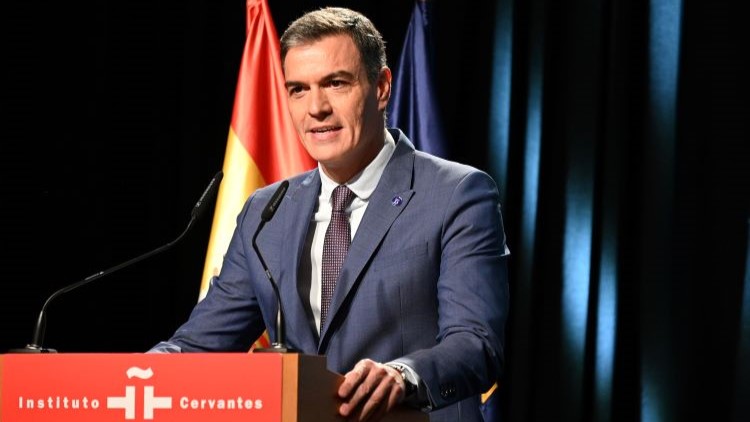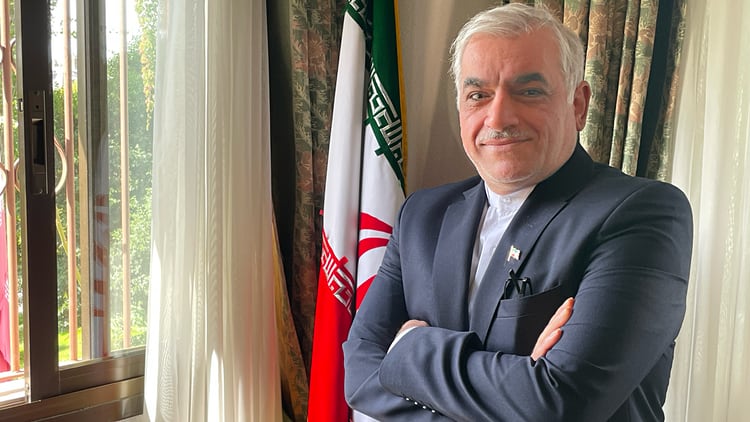The Diplomat
The acting Prime Minister, Pedro Sánchez, yesterday took advantage of the commemoration of the European Day of Languages to praise the “linguistic plurality” of Spain, a few days after the modification of the Rules of Procedure of the Congress regarding the use of co-official languages was approved and the EU Member States paralyzed their attempt to make official the use of Catalan, Basque and Galician in the European Union.
Sánchez participated in an event at the headquarters of the Instituto Cervantes in Madrid to commemorate the European Day of Languages, created in 2001 by the European Union to promote language learning in Europe and to recognize the richness of multilingualism, which is celebrated today, September 26. At the event, a special edition of Federico García Lorca’s poem Grito hacia Roma (Cry to Rome), translated into all the official languages of the European Union and the official languages of Spain, was presented, and the legacy of Rosalía de Castro was handed over to the Caja de las Letras of the Cervantes Institute.
In his speech, the President recalled that more than two hundred languages are spoken in Europe, “something unique in the world and exceptional for its singularity” and that “it deserves the highest level of protection from all the institutions of the Union”.
Sánchez also affirmed that Spanish “linguistic plurality” is a “unique value that defines us and makes us who we are”. “Listening in Parliament to the languages with which our compatriots name the reality of Spain was essential”, because “these languages are part of the great cultural legacy of our country and we must take care of them” and because “protecting a language is also a political decision. Just as it is to censor it or to cut it down”, he continued, in relation to the modification of the Rules of Procedure of the Congress.
“There are those who are tempted to caricature this effort, even those who invent battles and conflicts where there is only democratic normality,” he declared. “To those who reason in this way, I will say, with all due respect, that, as in so many other conquests and advances, time will eventually prove progress and coexistence right. Instead of the transitory noise of the present, the hope of tomorrow”, he added. “Pride in a national identity should never be confused with a closed feeling or with the rejection of the knowledge of others,” he warned.
The ceremony was also attended by the director of the Instituto Cervantes, Luis García Montero, and the president of the Consello da Cultura Galega, Rosario Álvarez, and was attended by the acting ministers of Foreign Affairs, José Manuel Albares, and of Education and Vocational Training, Pilar Alegría.
Pedro Sánchez’s presence at the event came six days after the European partners decided that there is no urgency in making the use of Catalan, Basque and Galician official in the European Union, as the Spanish government intended, and opted to postpone any decision on the matter pending a legal opinion from the EU Council on the consequences of the measure and an analysis of the economic, political and practical impact it would have. Sánchez’s Executive had tried to get the support of the EU-27 for this initiative, agreed with the Catalan and Basque pro-independence supporters in order to gain support for his investiture as head of the Government.
For his part, José Manuel Albares declared yesterday, during a meeting organized by the Association of European Journalists (APE) in Madrid, that the Government is working to “try to make progress as soon as possible” in this matter. In any case, he recalled that no Member State expressed its veto in the General Affairs Council (GAC) last September 19 (the change of the linguistic regulation of the EU requires the unanimity of the 27), despite the fact that “that was the day to do it if anyone is against it”, and assured that “the reality is that all the Member States agree to work with Spain so that Catalan, Basque and Galician are official languages of the EU”.







